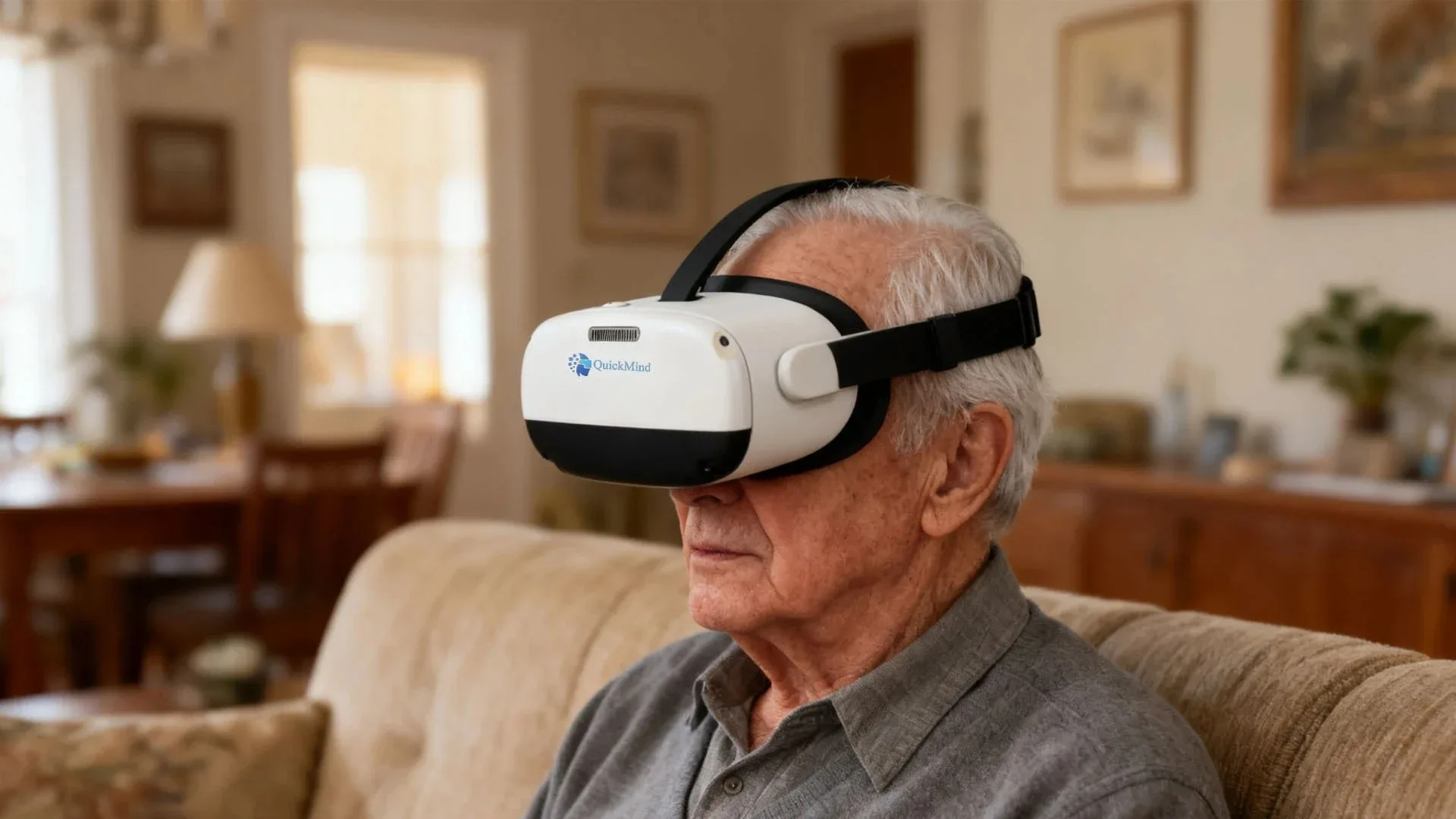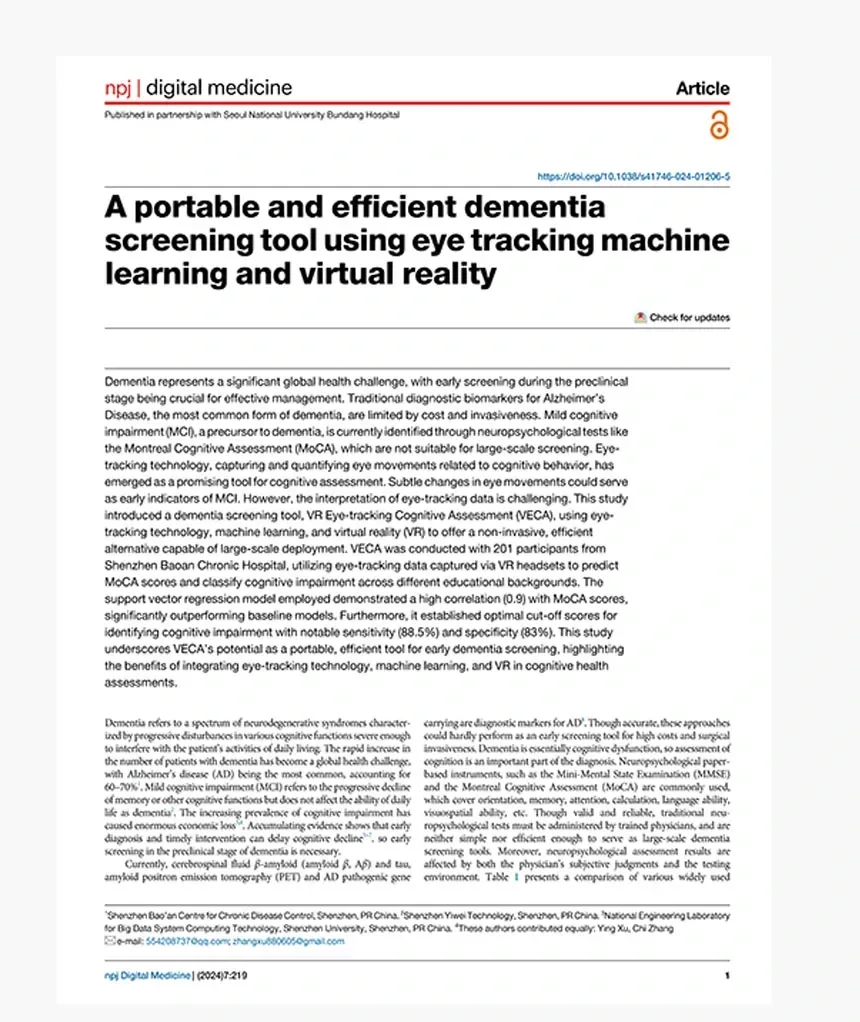
Progressive analyses proposes that augmented reality platforms strategy can noticeably augment the welfare of patients diagnosed with dementia. By shifting them to tranquil locations, VR furnishes a unique chance for mind energizing, mood control, and interpersonal communication. Various research works have indicated that VR therapy can lower fretfulness, anxiety, and despondency in dementia patients while also refining their mindfulness, mindfulness, and conversational capabilities.
- VR enables clients with dementia to relive cherished memories through interactive animations.
- Moreover, it can deliver a safe and assisting space for community involvement, encouraging a realization of union and belonging.
- Specialists assert that VR therapy has the likelihood to remodel dementia therapy by providing new and progressive approaches to address the elaborate problems faced by users struggling against this condition.
Advanced Digital Care for Cognitive Support in Alzheimer's
Developing cyber treatments are proving useful in the province of mind sharpening for people affected by Alzheimer's ailment. These interfaces make use of electronic devices to activate brain function and supposedly mitigate the aggravation of the condition. Engaging routines, personalized guidance, and mental training are some demonstrations of approaches being investigated in this growing domain. While analyses are advancing, digital therapeutics afford a additional means for upgrading the health of those managing cognitive Alzheimer's illness.Novel VR Techniques for Alzheimer's Intervention
With respect to clients facing Alzheimer's dementia, the slow erosion of recollection and neural capabilities can significantly influence their competence to associate with the immediate surroundings. This damaging syndrome often elicits in solitude, agitation, and a lessened individuality. Recent progresses in virtual reality technology bring a state-of-the-art means to address these concerns by creating immersive atmospheres that can trigger the brain and refresh cognitive function.
Simulated reality settings tailored specifically for Alzheimer's patients can convey them in familiar venues, such as their former home or a chosen recreational spot, eliciting positive memories and diminishing anxiety. Through interactive tasks, these virtual settings can also promote cognitive abilities like retention, focus, and judgment.
The positive effects of virtual reality in Alzheimer's intervention are extensive. Early research have disclosed promising results, with users displaying improvements in cognitive function, mood, and overall quality of life. As this tool advances, it holds the key to changing the way we approach Alzheimer's disease, offering a new pathway for care and advocacy.
Virtual Recollection Therapy for Alzheimer's
Reminiscence therapy is a well-respected technique used to augment cognitive function and affective health in individuals with Alzheimer's disease. This established form of therapy involves eliciting patients to relate past experiences, often through conversation. However, a cutting-edge approach is emerging: VR-mediated reminiscence therapy.
This immersive tool utilizes virtual reality headsets to immerse patients in lifelike environments that recall memories from their past. By immersing in these man-made contexts, individuals with Alzheimer's can communicate with their past in a meaningful way.
VR's Promise for Dementia Care: Enhancing Memory and Cognition
Virtual reality (VR) is emerging as a prospective medium in the fight against dementia, granting groundbreaking ways to improve memory and cognition. By constructing immersive worlds, VR can guide individuals with dementia recall memories, take part in meaningful activities, and develop cognitive powers. Studies have established that VR interventions can bring about considerable improvements in memory recall, attention, and geographical awareness. Moreover, VR provides a controlled and encouraging space for individuals with dementia to demonstrate, reducing feelings of isolation and unease.
- In addition, VR can be modified to individual needs and preferences, granting enhanced levels of interaction.
- Despite the possibilities of VR, continued research is needed to fully understand its long-term performance in dementia care.
Reviving Recollections, Restoring Bonds: VR's Influence on Alzheimer's Social Interaction
Artificial reality is emerging as a novel device in the branch of brain degenerative illnesses. By crafting absorbing and mutual settings, VR has the possibility to renew memories, promote social interaction, and enhance the overall quality of life for clients affected by Alzheimer's. Prominently an influential aspects of VR is its ability to move users to beloved environments and memories from their past. Whether it's a visit to a childhood home or a depiction of a beloved holiday, these virtual travels can summon happy memories and enhance cognitive skills. Furthermore, VR can aid social interaction by joining individuals with others who share similar experiences. This can be particularly valuable for people with Alzheimer's who may face difficulties with traditional social communication. By developing a safe and compelling virtual space, VR can lessen feelings of isolation and loneliness, which are common among people living with Alzheimer's. Overall, VR holds immense power for remodeling the lives of clients with Alzheimer's by rekindling memories, reestablishing connections, and boosting their quality of life. As technology advances to develop, we can expect even more innovative applications of VR in the field of dementia care.Exploiting Cognitive Training: Employing VR Tools for Alzheimer's Care
Simulated immersive settings is rapidly emerging as a state-of-the-art tool in the realm of cognitive training, particularly for people dealing with Alzheimer's disease. By immersing patients in interactive and engaging virtual environments, VR-based interventions can stimulate cognitive functions such as memory, attention, and problem-solving. These games usually incorporate elements of storytelling, exploration, and social interaction, making the training process significantly appealing. Studies have shown that VR-based cognitive training can lead to marked improvements in cognitive performance, hypothetically delaying the progression of Alzheimer's symptoms. Moreover, VR provides a safe and controlled environment for patients to practice new skills and reinforce their confidence.
- Play-based techniques in VR training can make it exceptionally compelling and amusing for patients with memory problems.
- VR simulations can offer convincing scenarios that drive and improve cognitive functions.
- Personalized VR experiences can cater to distinct expectations and habits.
Exploring VR's Advantages in Dementia Support
Engaging simulated worlds offer a innovative and favorable avenue for subjects undergoing dementia. These approaches can simulate familiar environments, allowing those affected by cognitive decline to recapture cherished memories and build a sense of familiarity. By reducing the burdens of dementia, VR contexts have the potential to elevate quality of life for both subjects and their advocates.
- Studies indicate that VR treatments can substantially impact cognitive function, psychological well-being, and even motor abilities in individuals with dementia.
- Moreover, VR furnishes a safe and organized environment for discovery, reducing the risk of harm.
- Likewise, VR can support social associations by allowing individuals with dementia to participate in computer-generated activities with others.
Utilizing Virtual Reality for Early Alzheimer's Identification and Management
Alzheimer's condition represents a multifaceted barrier, often continuing unnoticed in its early stages. Still, virtual reality (VR) is materializing as a revolutionary tool for precocious diagnosis. Through immersive scenarios, VR can evaluate cognitive abilities in ways that traditional methods are insufficient to. This capacity allows for early treatment strategies, potentially stalling disease progression and elevating the quality of life for subjects with Alzheimer's.
- Virtual reality tools assess memory, concentration, and spatial cognition under supervision.
- Adaptive virtual reality tools motivate subjects to engage in neural stimulation efforts.
- Immersive VR scenes foster connection and communication for Alzheimer's individuals.
Enhancing Dementia Communication and Social Interaction Via VR
{In the realm of dementia care, innovative technologies are emerging to boost the lives of subjects facing dementia challenges. Virtual reality (VR) is one such technology that holds immense opportunity for connecting individuals with dementia through improved interaction and communication. By simulating captivating interactive virtual spaces, VR can stimulate cognitive function, reduce behavioral issues, and ultimately improve the overall well-being of clients affected by dementia.
VR experiences optimized for dementia therapy can range from recollection therapy sessions that immerse patients in recognizable historic moments, to interactive games that promote social interaction and cognitive stimulation. Furthermore, VR has the capacity to connect users experiencing dementia with caregivers, regardless of physical separation, fostering a sense of belonging.
- VR can empower in reducing agitation and anxiety by providing a calming and enthralling environment.
- Clinical trials have shown that VR interventions can lead to improvements in cognitive function, mood, and social interaction in people affected by dementia.
- As technology evolves in progress, we can Alzheimer’s disease expect even more innovative and {effective|beneficial|helpful|powerful|impactful|successful|productive|efficient
